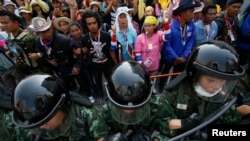BANGKOK —
Electoral officials in Thailand say they cannot schedule further voting in the nation's tense national election until protests that hampered the polling ends. Anti-government protesters disrupted voting Sunday and have vowed to continue mass street demonstrations to topple the caretaker government of Prime Minister Yingluck Shinawatra.
Unofficial figures indicate about 45 percent of eligible voters participated in Sunday’s vote. If confirmed, it would be a sharp drop from the 75 percent who voted in 2011 elections.
While many voters stayed away from the polls, others in parts of Bangkok and southern Thailand were unable to vote because protesters prevented ballots from being delivered.
Second round
The caretaker government has said it will hold a second round of polls for people who were not able to vote Sunday.
But Thailand's senior election commissioner Somchai Sisutthiyakorn said Monday, elections for those areas could not be held until the ongoing anti-government protests end.
Somchai said for the elections to succeed both sides in the political turmoil must compromise, and as long as conflict continues the election would never succeed.
Although voter turnout was low, ballots were cast in almost 90 percent of polling stations nationwide. Voting was canceled in 69 constituencies in 18 provinces.
Candidates came from 53 parties led by the governing Pheu Thai Party of Prime Minister Yingluck Shinawatra. In the capital, Bangkok, center of the anti-government campaign to prevent voting, turnout was estimated at a low 25 percent.
More protests
A day after the vote, protesters returned to the streets in downtown Bangkok, and surrounded a government building where the prime minister was meeting.
Protest leader Suthep Thangsuban announced the group would dismantle two protest sites, and concentrate their efforts on several existing rally-points in the city.
Government opponents are expected to lobby Thailand’s courts to nullify Sunday’s election, posing additional challenges to the ruling party.
But Gothom Areeya, director of Mahidol University's Research Center for Peace, is hopeful that despite the legal challenges, the election process should carry on.
"The nullification of the election is a threat because the judiciary has so far issued so many rulings that for me was not completely logical," Gothom said. "[But] if we have the will to continue this difficult process of election we will be able to compete it and produce a parliament."
Late last year, the Constitutional Court ruled that the ruling party’s proposal to fill all of Thailand’s Senate seats through direct elections was an attempt to “overthrow” democracy. Currently half of the seats are appointed by civil servants and judges.
In Thailand's political impasse, protesters accuse the ruling party of rampant corruption and excessive influence from former prime minister Thaksin Shinawatra. Thaksin, the brother of Prime Minister Yingluck, lives in exile to avoid a jail term on corruption charges.
WATCH: Related video footage
Unofficial figures indicate about 45 percent of eligible voters participated in Sunday’s vote. If confirmed, it would be a sharp drop from the 75 percent who voted in 2011 elections.
While many voters stayed away from the polls, others in parts of Bangkok and southern Thailand were unable to vote because protesters prevented ballots from being delivered.
Second round
The caretaker government has said it will hold a second round of polls for people who were not able to vote Sunday.
But Thailand's senior election commissioner Somchai Sisutthiyakorn said Monday, elections for those areas could not be held until the ongoing anti-government protests end.
Somchai said for the elections to succeed both sides in the political turmoil must compromise, and as long as conflict continues the election would never succeed.
Although voter turnout was low, ballots were cast in almost 90 percent of polling stations nationwide. Voting was canceled in 69 constituencies in 18 provinces.
Candidates came from 53 parties led by the governing Pheu Thai Party of Prime Minister Yingluck Shinawatra. In the capital, Bangkok, center of the anti-government campaign to prevent voting, turnout was estimated at a low 25 percent.
More protests
A day after the vote, protesters returned to the streets in downtown Bangkok, and surrounded a government building where the prime minister was meeting.
Protest leader Suthep Thangsuban announced the group would dismantle two protest sites, and concentrate their efforts on several existing rally-points in the city.
Government opponents are expected to lobby Thailand’s courts to nullify Sunday’s election, posing additional challenges to the ruling party.
But Gothom Areeya, director of Mahidol University's Research Center for Peace, is hopeful that despite the legal challenges, the election process should carry on.
"The nullification of the election is a threat because the judiciary has so far issued so many rulings that for me was not completely logical," Gothom said. "[But] if we have the will to continue this difficult process of election we will be able to compete it and produce a parliament."
Late last year, the Constitutional Court ruled that the ruling party’s proposal to fill all of Thailand’s Senate seats through direct elections was an attempt to “overthrow” democracy. Currently half of the seats are appointed by civil servants and judges.
In Thailand's political impasse, protesters accuse the ruling party of rampant corruption and excessive influence from former prime minister Thaksin Shinawatra. Thaksin, the brother of Prime Minister Yingluck, lives in exile to avoid a jail term on corruption charges.
WATCH: Related video footage












